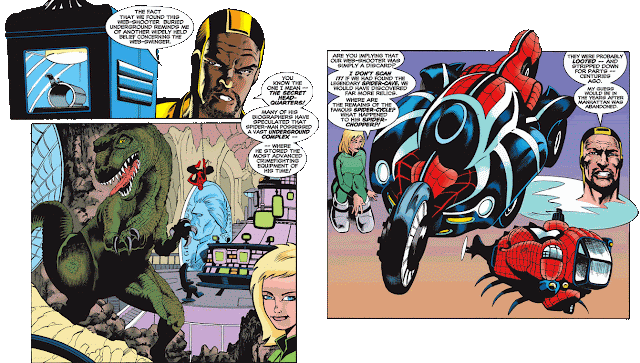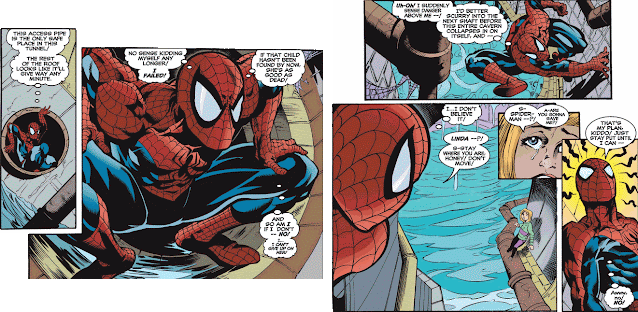It you stayed an Amazing Spider-Man reader until the series concluded its first run in late 1998, you may remember an unusual issue by writer Tom DeFalco that saw print shortly before then, which involved two enthusiastic archaeologists in the distant future who felt they had made the most remarkable discovery of their young careers.
Both Zack and Lana consider themselves authorities on the "Age of Heroes," which is not to be confused with this promotional banner that circulated on select titles over a decade later in mid-2010...
...nor is the term related to a four-issue series which coincided with the publication of the Heroic Age titles:
Rather, for Zack and Lana, the "Age of Heroes" is a historic reference to a period of time when super-heroes were alive and active on Earth. From what we can gather from the story, it's been hundreds of years since super-heroes existed in the world--and as we tag along with this pair on their excursion into the ruins of Manhattan, it's apparent that they hold one particular hero in the highest regard: Spider-Man.
But as we'll see, their history of the wall-crawler's life is incomplete and, in some cases, exaggerated in terms of his standing with the public--factual misinterpretations which will also apply to other heroes from that era, as well as to his wife, Mary Jane Parker.
Back in their lab, the equipment our scientists have at their disposal confirms the web-shooter's authenticity--and it seems they're not alone in tracking down historical remnants of the Age of Heroes.
And speaking of saving the world, Zack's musings about what the man behind the mask of Spider-Man was like serve to trigger a segue to our own time period, where we find Mary Jane attempting to lift the spirits of our hero after a particularly trying day which has him wondering if his efforts in battling criminals are doing any good in the long run. Regrettably, his R&R will be interrupted by a crisis that will end up having more far-reaching implications than either Spider-Man or ourselves can imagine.
From this point, DeFalco's story juxtaposes with the various assumptions made by Zack and Lana about the heroic subject of their good fortune this day, their speculations contrasting sharply with the reality of Spider-Man's life as we know it.
Thanks to this issue's cover, and Richard Starkings' Comicraft captions specifically, we also have several questions to resolve in this dual story--all of which will be dealt with by Lana and Zack, so we'll probably need to take their answers with a grain of salt. The first one seems harmless enough:
I suppose if you have a Spider-Mobile on record, it's fair for future historians to speculate on what other pieces of equipment Spider-Man might have been using. Obviously those speculations have been passed down through the centuries, so that, by the time Zack and Lana are trying to further piece together aspects of the wall-crawler, they feel they have the basis for continued speculation based on others' "research."
I don't know about a "spider-cave," but we've seen various versions of the 'cycle and the 'copter among the Spidey toys which were sold in the '70s. As for the caption, I have no idea what it could be referring to, though maybe it was information that Lana and Zack weren't privy to--namely, that the Spidey-Cycle was never built (or, thankfully, conceived).
In reality, however, Mary Jane was never the social butterfly among the hero set that Lana believes. As to her "fate" (aside from dying like everyone else)... well, thanks to Mephisto, whatever assumptions in that regard that have been passed down through the centuries are now nonexistent.
As for the Spider-Man you and I are far more familiar with, he's committed to saving a little girl named Linda (and judging by how deserted the areas are that he's searching, emergency responders are way off on the location where her friend must have reported her in). In so doing, we learn the circumstances under which the historic artifact uncovered by Lana and Zack came to be found--though unless they unearth a few Daily Bugle editorials or sponsored television spots, they'll never know how mistaken history has been on the influence and popularity of Spider-Man.
Though technically, we'd have to consider the likelihood that it refers to a new Age of Heroes, depending on Zack's newfound resolve to follow in his idol's footsteps...





















All the Marvel time travel tales and campfire stories I've seen over the years have shown no end of demi-gods, aliens, mutants, freaks, and assorted traditions (ie: who is the new "Iron Fist"? Sorcerer Supreme? etc) existing thru history. The 20th-21st century period may be a noteworthy period of superhero abundance, but I think a time period with NO heroes is far more historically startling.
ReplyDelete